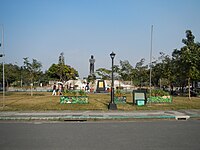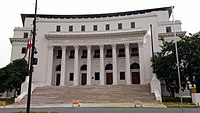Agrifina Circle
| Agrifina Circle | |
|---|---|
| Teodoro F. Valencia Circle (official) | |
 | |
 | |
| Location | |
| Rizal Park, Ermita, Manila, Philippines | |
| Roads at junction | General Luna Street Minor roads inside Rizal Park |
| Construction | |
| Type | Traffic circle |
The Agrifina Circle, officially the Teodoro F. Valencia Circle, is a traffic circle within the eastern portion of Rizal Park in Manila, the Philippines.[1]
Etymology[]
The name "Agrifina" is a portmanteau of the words "Agriculture" and "Finance" since two neoclassical buildings located on opposite ends of the circle formerly housed the Departments of Agriculture and Finance. The former building of the Department of Finance today houses the National Museum of Anthropology, while the former building of the Department of Agriculture formerly housed the Department of Tourism until 2015, when the building was vacated to make way for the new National Museum of Natural History.
The circle was officially renamed to Teodoro F. Valencia Circle on January 5, 1990 through Republic Act No. 6836.[2]
History[]
The Agrifina Circle was intended to be a grand civic plaza linking the planned National Capital Building to five wedge shaped buildings which included the Finance and Agriculture Buildings.
After World War II, when it was decided that the capital of the Philippines was to be moved to Quezon City, the then-plaza was converted into a rotonda. Vehicular traffic was allowed in road until the late 1960s when Rizal Park was consolidated and most roads going through the park were pedestrianized. A globe fountain and skating rink was installed at the central island.[3]
There were plans to construct a 390 metres (1,280 ft) observation tower, the Luneta Tower at the Agrifina Circle for the Centennial celebration of Philippine Independence in 1998. The decision to build the tower at the site, however, was controversial and the plan was eventually shelved.
In 1998, the Binhi ng Kalayaan Monument replaced the fountain but the skating rink remained.[1] The monument was later moved to a barren area of Rizal Park in 2004 and was replaced by Sentinel of Freedom, a monument dedicated to Lapulapu.
Layout[]
| Eastern side | ||||
| Taft Avenue | ||||
| Binhi ng Kalayaan Garden |
* | Relief Map of the Philippines |
* |  Children's Park |
| Road | Agrifina Circle | General Luna Street | ||
 National Museum of Anthropology |
 Sentinel of Freedom |
 National Museum of Natural History | ||
| Road | Agrifina Circle | Road | ||
 Orchidarium |
* | Bisig Marker |
* | National Parks Development Committee Compound |
| Maria Y. Orosa Street | ||||
| Rest of Rizal Park | ||||
| Western side | ||||
| Note: (*) Footpath | ||||
References[]
- ^ a b Aning, Jerome; Rivera, Blanche (7 May 2000). "Blast rocks Rizal Park". Philippine Daily Inquirer. Retrieved 29 July 2016.
- ^ "REPUBLIC ACT NO. 6836 - AN ACT CHANGING THE NAME OF THE AGRIFINA CIRCLE, A CIRCULAR ROAD NEAR THE LUNETA PARK IN THE CITY OF MANILA, TO TEODORO F. VALENCIA CIRCLE". Chan Robles Virtual Law Library. 5 January 1990. Retrieved 29 July 2016.
- ^ Alcazaren, Paulo (14 July 2001). "Rotundas: Circles of urban life". City Sense. The Philippine Star. Retrieved 29 July 2016.
- Streets in Manila
- Tourist attractions in Manila
- Roundabouts and traffic circles in the Philippines
